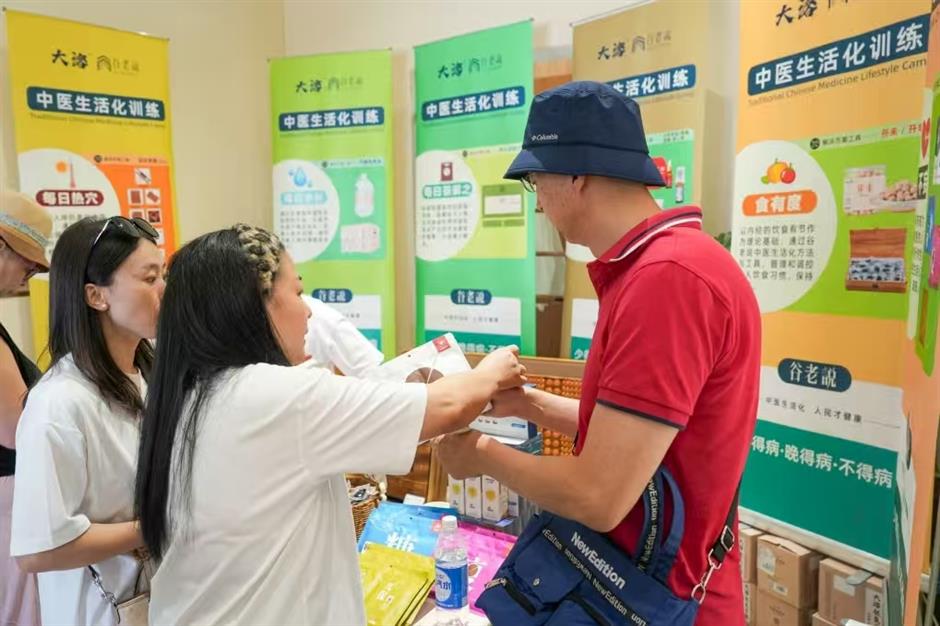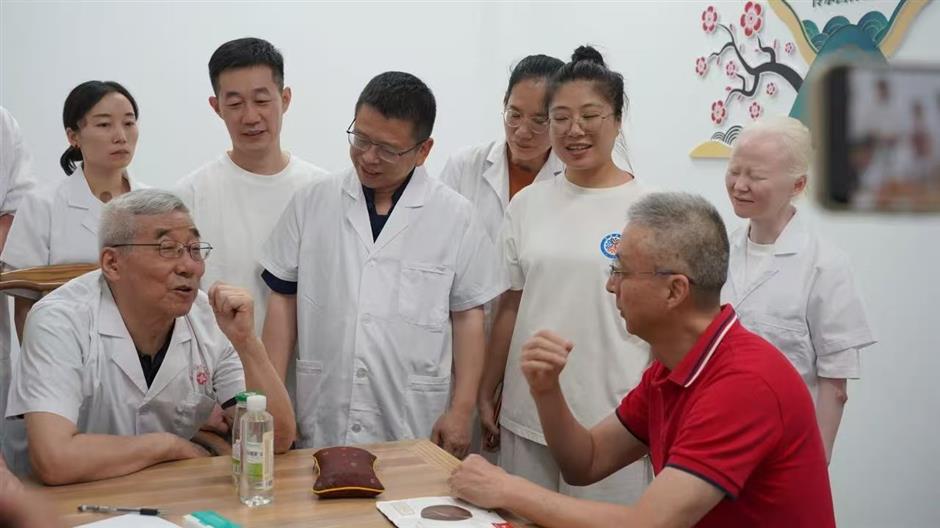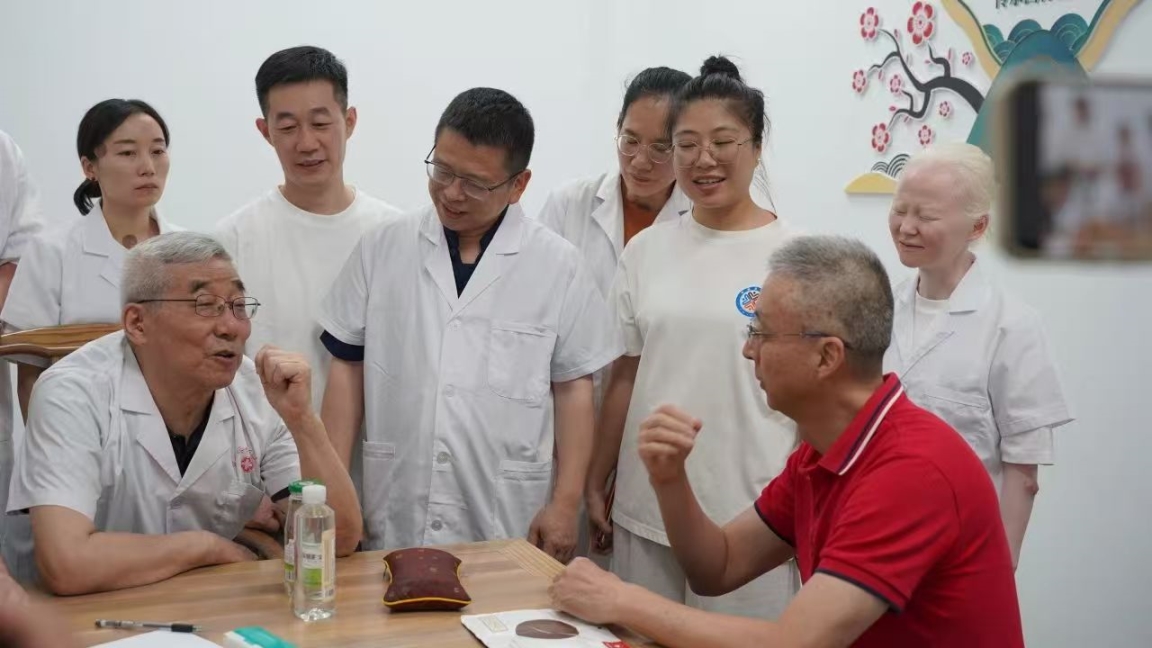
It was scorching hot on August 19, and I was short of breath now and then as I shuffled from one building to another during a busy field interview in a bucolic village in the western suburbs of Shanghai.
Long accustomed to a sedentary lifestyle, I rarely walked long hours under such melting heat. However, instead of feeling defeated, I took pride in being heavily tanned and imagined I might look healthier this way.

Sunshine on a sidewall of the multifunctional hall at Dongshe Village
My vanity vanished quickly.
The moment I entered a multifunctional hall in Dongshe Village, Qingpu District, where a traditional Chinese medicine (TCM) lifestyle festival was to be inaugurated shortly, I noticed a rosy-cheeked elderly woman busy doing a cleaner's job, both indoors and outdoors. She looked a bit older than me but bounced with energy.
"You look so well," I took the initiative to strike up a conversation. I didn't hesitate to praise her for her seemingly never-ending energy in working under the summer heat.
"Yes indeed, " she replied. She was apparently proud of her glowing complexion that exuded rude health.
Then, she looked at me and said frankly: "Why, your skin looks yellowish."
Instantly I saw the gap between us: It's a lifestyle gap. It wouldn't be overcome by the unusual sun exposure I happened to get in just one day.
At work, she moves around, gets enough sun exposure, and refrains from addiction to her cellphone. Later I learned that she usually gets up at around 4am and goes to bed before 8pm, and that when she sleeps, she sleeps like a log, not to be disturbed by any noise.
In contrast, it can take me a whole day or three consecutive days to write a news story in an indoor space, where I hardly move around, let alone exercise. My occasional exposure to the elements like that on August 19 amounts to nothing compared with her regular toil and sweat in the village, rain or shine.
Worse, my sleep quality is nowhere near hers. Sometimes I read into the wee hours, sometimes I get up every two hours at night to drink water, and sometimes my mind is so full of drifting ideas that I cannot easily fall asleep, let alone sleep like a log.
I told her I'm 59 years old this year, and she said she's 64. I took off my hat to show her the premature graying of my hair, and she doffed her conical bamboo hat to show me how thick and black her hair is.
"Just think how much sun exposure I've got in my life as a farmer," she said to me, hinting at a lack of work in the bosom of nature on my part. Now she is retired as a farmer but "recruited" as a cleaner.
A first TCM physical check
Her intuitive judgment of my sub-health soon proved true.
After saying bye to her, I was attracted by a crowd of people waiting in a half circle at the center of the multifunctional hall for physical checks by an AI-powered TCM diagnostic system. When it was finally my turn, a young volunteer put a metal ring on the index finger of my right hand and asked me to be quiet. A special chip inserted in the metal ring then began to "feel" my pulse, whose vibration patterns would reveal my overall health status with an accuracy rate of more than 90 percent.
The AI diagnostic system was largely based on the medical expertise of Gu Shizhe, a national accredited TCM master specializing in acupuncture.
Within 90 seconds, an AI-generated diagnostic report popped up on the computer screen. The volunteer interpreted the report as follows: Your blood stasis is severe, which means your blood isn't flowing smoothly. Moreover, there's too much pathogenic dampness in your body. It's like your internal system is waterlogged, which makes you feel heavy and sluggish.

A TCM volunteer (in white T-shirt) helps visitors check their health status with the aid of an AI-powered TCM diagnostic instrument.

A TCM volunteer helps the author (in red T-shirt) find relevant acupoints.
No wonder.
I had intermittently studied TCM theories as an amateur and knew that blood stasis would cause one's skin to look pale and one's tongue to have a dark purplish hue. I also knew that pathogenic dampness would induce chronic coughing and aggravate blood stasis. But I never knew that my overall blood stagnation and pathogenic dampness had reached such a severe level.
Both are typical TCM concepts one hardly encounters during physical checks conducted under the guidance of Western medical theories. For example, my annual Western-style physical checks in the past all indicated a normal blood situation, except that I had developed carotid artery stenosis. I hadn't been alerted to any overall deterioration of my blood stasis, let alone my worsening dampness that reinforces my blood stasis.
Indeed, it was the first TCM lifestyle physical check I had ever had. So it was the case with many others who came on August 19 to attend the opening ceremony of the fortnight festival showcasing the TCM way of life.
So, when auntie Hang announced that my skin looked yellowish, she was right, although she might not know about my poor blood circulation or pathogenic dampness.
A young man who had a paler complexion than mine sat for the AI TCM diagnosis after I was done. As there were too many people watching the diagnostic process, I distanced myself a little bit from the crowd. The TCM volunteer was so busy that he didn't even find time to drink, let alone have his lunch on time.
The surprising popularity of the AI TCM diagnostic system based on Gu Shizhe's expertise reminded me of the similar popularity of quite a few AI TCM diagnostic instruments displayed at the 2025 World Artificial Intelligence Conference held in Shanghai in July, including one based on tongue diagnosis and another based on the health status of a patient's tongue, complexion, pulse and Q&As between the patient and the AI "doctor."
A report by Shanghai Securities News released at the end of July noted that AI application in Western medicine is relatively mature, while the AI journey in TCM has just been kick-started. The news report, which predicted a huge market potential for AI application in both Western medicine and TCM in China, was later reprinted by the Shanghai Municipal Commission of Economy and Informatization.
Unlike blood tests or electrocardiograms widely used in Western medicine, which are standardized, the vibration pattern of one's pulse and the color of one's tongue or cheeks are often subject to various interpretations of different TCM doctors. Thus the lack of a sufficient number of talented TCM doctors can stand in the way of an effective application of TCM wisdom in daily lives.
But with the help of large AI models, the expertise of one or many TCM doctors is being transformed into standardized diagnoses and therapies. In this way, physical checks based on TCM theories are increasingly popularized, as AI-powered TCM diagnostic equipment is available both at hospitals and in villages.
"Hey, my situation is worse than yours," the young man who had a physical check after me murmured. I was about to eat my lunch in a corner of the multifunctional hall of Dongshe Village when he approached me.
"My report says I have a mid-to-high risk for heart failure, although my blood stasis is not as bad as yours," he said.
He had clearly watched my diagnostic process. Then I learned he was 32 years old.
"Oh really?" I asked, not believing my ears. "You are younger than me!"
"But it's true," he said. "My heart often aches after I walk a few steps."
Later I understood he hardly exercises ever after he got married. In contrast, his wife exercises regularly, practising yoga and body-building. He said his wife also had an AI TCM test on August 19, and she was perfectly healthy.

Doctor Gu Shizhe (center, sitting) poses with his disciples.
The couple hails from Shanxi Province in northern China. He said his wife would attend a ceremony later that day to become one of the latest disciples of Gu, a veteran TCM doctor and professor at Beijing University of Chinese Medicine. The young man came with his wife to Dongshe Village in the hope of having an effective diagnosis of his heart problem.
"Well, professor Gu will provide pro bono medical treatment in the village's clinic this afternoon, let's go together," I suggested.
Eventually, some errands prevented him from going together with me, so I went first. When I arrived at the village clinic, Gu had already started. I swiped a QR code for registration and there were about six patients before me. When the 32-year-old man finally came, he had to wait far behind in a much longer line, unsure whether he would be able to see the good doctor before the free medical service was over that day.

Dr Gu Shizhe (left) tells the author how to improve his health.
Sleep well!
When it was my turn, Gu touched my right arm first, and then the left, to feel my pulse.
"A typical slippery pulse," he concluded.
Then he asked me to open my mouth. He examined my tongue, finding it to be thick and greasy with a dark purplish hue.
The doctor quickly diagnosed a phlegm-dampness syndrome in me. Then he asked his disciples to feel my pulse as well, teaching them how to tell a slippery pulse. I was glad I had become sort of a "teaching tool" in addition to being a patient.
He quickly dictated a prescription of certain herbal medicines, which was recorded by one of his disciples, but before he concluded my case, he stressed to me: "Make sure you sleep well!"
As I quit the clinic room, I silently said to myself: "How did the doctor know my sleep problem? I did not tell him anything about that."
After I came home, I consulted the Yellow Emperor's "Classic of Internal Medicine (Huangdi Neijing 黄帝内经)," a foundational TCM treatise on health and disease, and I began to see that overthinking or rumination will harm pi (脾), conveniently translated as the spleen but which has a much bigger role than the spleen in Western medicine. In TCM, pi is responsible for transforming and transporting food essences and body fluids. If pi is hurt, dampness arises. And "Huangdi Neijing" states clearly: si shang pi (思伤脾overthinking or rumination hurts pi).
Through thousands of years of development, TCM has made it clear that a good sleep goes a long way toward restoring one's peace of mind, therefore replenishing the energy of pi. When pi becomes strong again, it can better transform and transport food essences and body fluids, so that one's internal system is no longer damp.
On August 28, I met Dr Jiang Dayou, another acupuncture expert, during Dongshe Village's TCM lifestyle festival, and asked him if my understanding of "si shang pi" was correct. He said yes, overthinking or rumination does hurt pi.
After giving me a free acupuncture treatment to help cure my dampness and correlating coughing, he stressed: "Do practice diaphragmatic breathing (or abdominal breathing)!"

Dr Jiang Dayou treats a local villager who said she had difficulties falling asleep.
Jiang was too busy treating many villagers and tourists, so I didn't have time to ask him why such breathing is conducive to curing my dampness and coughing. Later, after consulting TCM theories and listening to the lectures of other TCM doctors, I came to realize that pi is also related to one's muscles and that pi and muscles reinforce each other. As such, diaphragmatic breathing strengthens one's belly muscles while sort of "massaging" the pi area.
So, to stay healthy, it's not just about having conventional medical care. More importantly, it's about living in a way that reflects the time-honored wisdom of TCM. Sleeping well and strengthening muscles are part of a fundamental solution to anyone who has unwittingly accumulated pathogenic dampness that induces coughing and blood stasis.
The 32-year-old man and I are just two examples of leading an unhealthy way of life. On August 28, a large group of boys and girls in their 20s came to Dongshe Village to learn about the TCM lifestyle, including listening to Jiang's lecture on how to protect the cervical spine. But before the lecture started, many boys and girls had already formed a line and asked Jiang to see if they were in sub-health.
Dr Jiang Dayou shows young people how to protect their cervical spines.
"Look, you have a bulging vein on the thenar eminence of your right hand," the doctor told a girl. "It means you have had too much cold drink, which is not good."
Habitual consumption of cold drink is another recipe for pathogenic dampness, besides overthinking and lack of muscle movement.
Had the girl known the meaning of a bulging vein on her thenar eminence, she would probably have refrained from drinking too many cold things earlier.
By the same token, had I known that sleep disorders and lack of exercise in the open would contribute to one's damp body constitution, I would have found a more fundamental and enduring solution to my chronic coughing.
I've suffered chronic coughing for six or seven years. I had seen some doctors of Western medicine and got better now and then, but whenever I keep a sedentary position for two or three hours, reading or writing for instance, coughing would come back to haunt me. And to think that I've paid little attention to the importance of sleep.
But I'm still lucky, like most other visitors to the fortnight TCM lifestyle festival. Finally – and at not too late a stage of our life – we were able to enjoy AI-powered TCM physical checks in our daily lives, and were fortunate enough to have met a group of TCM doctors and volunteers who patiently taught us why a TCM lifestyle is the best therapy for lasting health.

Dr Gu Shizhe addresses the opening ceremony of the TCM lifestyle festival held in Dongshe Village.
"Only by making TCM a lifestyle can people be healthy," Gu emphasized in his speech at the opening ceremony of the TCM lifestyle festival at Dongshe Village on August 19.
It's a tough task, but a glorious one.
On July 30, Xinhua news agency reported that nearly 27 percent of China's population acquired health literacy in TCM culture in 2024, up from nearly 13 percent in 2016. While significant progress has been made in enhancing public awareness of a TCM lifestyle, there's still much to be desired. After all, the majority of Chinese people have yet to understand why such a lifestyle matters.
Lifestyle medicine is a relatively new medical specialty in the West, but its principles have roots that extend back for centuries, said an article posted on the (US) National Library of Medicine last year. The article quoted Hippocrates, an ancient Greek philosopher and physician often regarded as the father of (Western) medicine, as saying that "in order to keep well, one should simply avoid too much food, too little toil." The same article also mentioned the roots of lifestyle medicine in ancient China.
But the article failed to mention one of the most important lines in "Huangdi Neijing": The sage makes sure people don't get ill instead of curing them after they fall ill.
To live the TCM way is to prevent us from living irregularly and irresponsibly in the first place. Rise and rest in harmony with nature, and eat in moderation.
It's never too late to change for the better.

